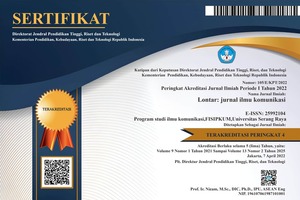PENGARUH SOCIAL MEDIA TWITTER SEBAGAI ALAT PROMOSI TERHADAP LOYALITAS PELANGGAN (STUDI KASUS FRED PERRY PLAZA INDONESIA PERIODE FEBRUARI – APRIL 2013)
DOI:
https://doi.org/10.30656/lontar.v2i3.340Abstract
Technological developments such as the existence of social media is now being used as a sales promotion tool. This is encourages division Marketing Public Relations Fred Perry Plaza Indonesia participated to create a twitter account @FredPerryId. Fred Perry Plaza Indonesia is to provide the best service, and ultimately, the customers are not just satisfied but can create customer loyalty.The purpose of this study was to determine the relationship and influence of social media twitter as a promotional tool to customer loyalty Fred Perry Plaza Indonesia period February to April 2013. This research method is quantitative - associative, through distributing questionnaires to 93 respondents, customers of Fred Perry Plaza Indonesia. In this study, there are two variables, namely variables social media twitter as a promotional tool (X) and customer loyalty variable (Y). The analysis in this study using a simple linear regression analysis. The results of the validity test, all the questions are valid because r value > r table (0.1716). From the results of the reliability test, all the questions stated reliable because Croncbach Alpha value > 0.6. The results achieved in this study is that the social media twitter as a promotional tool has significant relationships and significant effect on customer loyalty Fred Perry Plaza Indonesia the period February to April 2013. The conclusions in this study is information about new products is up to date delivered by Fred Perry Indonesia twitter account ( @FredPerryId ) is considered to be successful and good, so in this study to influence customers loyal and preferably, Fred Perry Indonesia over again listening to the input and advice that is often given by Fred Perry customers through twitter account @FredPerryId.Downloads
Published
Issue
Section
License
By submitting an article to the journal, the author(s) agree to transfer the published article's copyright to the journal, which will act as the publisher. This means the journal will have the right to publish the article in various forms, including reprints. The journal will maintain the publishing rights to the published articles.
In line with the license, authors and third parties (readers, researchers, and others) are allowed to share and adapt the material. In addition, the material must be given appropriate credit, provided with a link to the license, and indicated if changes were made. If authors remix, transform, or build upon the material, authors must distribute their contributions under the same license as the original.






